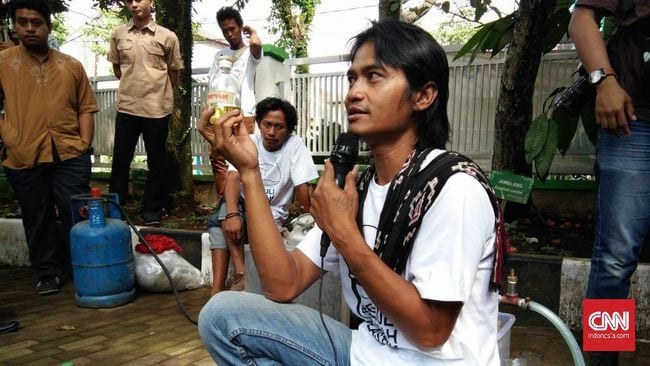DIMAS BAGUS MAKES FUEL OUT OF PLASTIC WASTE

-
Date:
14 Dec 2019 -
Author:
Admin WIT
Plastic trash is an extremely concerning issue. To combat this, a variety of initiatives have been developed, from limiting use to recycling it as a raw material for numerous valuable items.
An inventive thinker, Dimas Bagus Wijanarko (42) is a young man. It does not need magic to convert waste plastic into fuel. With the help of the Get Plastic community, he developed a tool for converting plastic trash into fuel.
“At first, we had trouble since it was ineffective. Even if you can, the fuel’s quality isn’t great. We received the results we anticipated in the seventh trial,” according to a recent report of Mongabay Indonesian.
The instrument, dubbed GP07, was developed by Dimas over the course of three to four years. His fear that plastic trash is out of control is what led to the creation of the machine. Moreover, only temporary optimization has been done to the processing so far.
“Yet that does not imply that I do not defend the processing that was done. Why not try it if there’s a better approach that also gives a high-quality result?”, he explained.
The man who received his degree at STM Petra Surabaya explained that the GP07 was constructed using components that were simple to come by, like PVC pipes and old tubes. Dimas asserts that his invention, despite being straightforward, should not be taken lightly. The cetane value contained was higher than Pertamina Dex, according to laboratory studies.
The instrument uses dry distillation as part of a pyrolysis process to create oil. Pyrolysis is the process of thermochemically breaking down a substance by heating it to its maximum temperature while using little to no oxygen and other chemical agents. In the initial phases, pyrolysis is crucial in converting the polymeric material to gas. It takes 5 to 10 minutes to complete this heating process.
“To put it simply, sorted and cleaned plastic garbage is placed in a tube and heated at a temperature of 400 to 500 degrees Celsius. The plastic will chemically deteriorate and disintegrate inside the oxygen-tight container, forming a gas. Also, the gas will cool and transform into fuel oil, a liquid that is similar to gasoline or diesel,” Dimas added..
He further explains that oil created through GP07 processing has the potential to replace fossil fuels as a source of energy. Crude oil fuel can be made from one kilogram of plastic garbage. This oil has an octane value of RON 84 undiluted. It can be used for oil burners, diesel engines, and motor vehicle fuel. Most suitable for diesel engines, he added.
Promotion Travelling
Dimas took an expedition to the island of Bali on a motorcycle loaded with refined GP07 oil to show and prove the value of the fuel oil produced. Midway through May 2018, the expedition departed from the Get Plastic office located at Jalan Pengadegan Timur II 28C, Pancoran, South Jakarta. With the help of this expedition, waste management will be discussed in a beneficial and acceptable way.
“We interact with local governments and communities through visits as well as through conversations and training on garbage management. The intention is to educate them,” he said.
The lack of a waste processing system was a concern in all 12 of the cities Dimas had visited throughout his journey: Bogor, Cimahi, Bandung, Rajagaluh, Cirebon, Boyolali, Jepara, Karimunjawa, Rembang, Yogyakarta, Pati, Surabaya, and Blitar.
Dimas stated that the motorbike’s fuel consumption was significantly more frugal during the journey. For instance, a travel from Jakarta to East Java only uses about 45 liters. It only requires 70 liters to get to Bali.
“My motorbike did not have any big problems during the trip,” he said.
In Indonesia, plastic is still used often in everyday items like bags and beverage bottles. According to data from the Central Statistical Agency (BPS: Biro pusat Statistik), the largest daily garbage output peaked in 2015 at 3,346 tons and rose to 3,429 tons in 2016. The majority of this waste was produced in major cities including Makassar, Surabaya, Jakarta, Denpasar, and Surabaya.
Given the low degree of public awareness, this number rises. Based on information from the Ministry of Environment and Forestry’s Directorate General of Trash, Waste, and Hazardous Material Management (PSLB3: Pengelolaan Sampah, Limbah dan Bahan Berbahaya Beracun), it is estimated that Indonesia produces 24,500 tons of plastic waste every day. Around 8.96 million tonnes would be produced if accumulated over a year. In 2019, 68 million tonnes of trash are anticipated to be produced in Indonesia.
According to Jenna R. Jambeck, China is the top contributor of plastic waste to the ocean, with Indonesia coming in second. Indonesia produces 187.2 million tons of plastic garbage, according to the author of the paper entitled Plastic Waste Inputs from Land into the Ocean.
Source: http://www.mongabay.co.id
